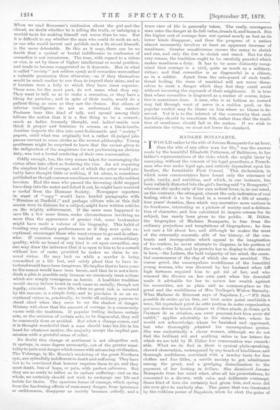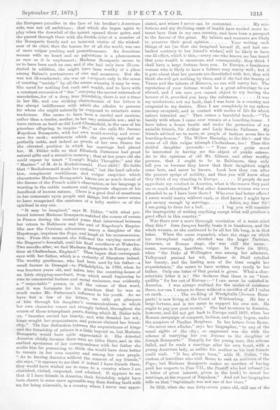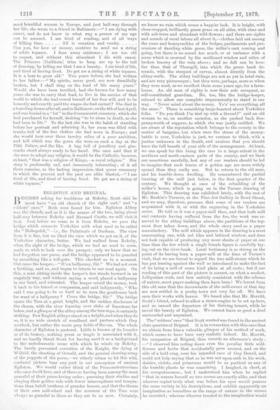MADAME BONAPARTE.
"T WOULD rather be the wife of Jerome Bonaparte for an-hour, 1 than the wife of any other man for life," was the answer made by the beautiful Elizabeth Patterson, of Baltimore, to her father's representations of the risks which she might incur by marrying, without the consent of his legal guardians, a French- man who was under legal age, and entirely dependent upon his brother, the formidable First Consul. This declaration, in which smile commentators have found only the utterance of pride, vanity, and ambition, and which, in one instance, has been unfairly distorted into the girl's having said "a Bonaparte," whereas she spoke only of her own ardent lover, is, to our mind, on the contrary, the strongest, almost the only indication of real feeling, which is to be found in a record of a life of ninety- four years' duration, than which any.narrative more curious in its frankness, interesting as a picture of society and a delinea- tion of character, and lees calculated to inspire esteem for its subject, has rarely been given to the public. M. Dither, the biographer of Madame Bonaparte, is free from the ordinary prejudices and temptations of biographers ; he does not care a bit about her, and although he makes the most of the externally romantic side of her history, of the con- trasts and incongruities which appeal to the imagination of his readers, he never attempts to disguise, in his portion of the work,—the Life, and he permits her to display to the utmost in hers,—the Letters, the bald vulgarity of her mind, the essen- tial commonness of the clay of which she was moulded. The coarse greed, the unscrupulous worldliness of the beautiful young woman, who was divorced' by her husband when hill high fortunes required him to get rid of her, and who renewed the divorce on her own part when his downfall made it advisable for her to secure her wealth against his necessities, are as plain and as common-place as the greed and the worldliness of Mrs. Trollope's Widow Barnaby. What Madame de Rominiat says of Napoleon L,—" S'il tait possible de oroire qu'un otre, sur tout autre point semblable nous, filt aependant priw5 de cette portion de notre organisation qui nous donne le besoin d'aimer et d'être aimes, je dirais qu'it l'instant de sa crGation, son coaur pourrait fort lien avoir 45t6 oubli6," applies admirably to his sister-in-law, whom he would not acknowledge, whom he 'banished and oppressed, but who' thoroughly .admired his unscrupulous genius. She was undoubtedly a clever woman, although we do not find the brilliant wit and scathing satire in her letters for which we are told by M. Didier her conversation was remark- able. What we do find in them is cynical plain-speaking, shrewd observation, untempered by any touch of kindliness, and thorough sordidness, combined with a tawdry taste for fine clothes and fine titles, a servile anxiety to get admittance among the great, and a grudging disinclination to the payment of her footing in dollars. She dismissed Jerome Bonaparte from her mind when, after all his protestations, he collimated to a divorce, with calm and deliberate contempt Some kind of love she certainly had given him, and none did she ever give to anybody else: The game that was frustrated by the ruthless power of Napoleon, when he shut the gates of the European paradise in the face of his brother's American wife, was not all ambitious ; that which she began again to play when the downfall of the tyrant opened those gates, and she passed through them with the double 4e1at of a member of the Bonaparte family and an innocent victim of the wicked- ness of its chief, then the beaten foe of all the world, was one of more vulgar pushing and pretentiousness. An American woman with no heart and no patriotism is a phenomenon as rare as it is unpleasant ; Madame Bonaparte seems to .us to have been such an one, and if she had only been ill-con- ducted in addition, she might have been worthy of a place among Balzac's portraitures of vice and meanness. But she was not ill-conducted ; she was an imirigante only in the sense of courting "society" by all the means whereby it may be won. She cared for nothing but rank and wealth, and to have with a constant succession of " fine " company the merest externals of association, for of a deep, true friendship, there is not a trace in her life, and one striking characteristic of her letters is the abrupt indifference with which she alludes to persons for whom she might naturally be supposed to entertain some tenderness. She seems to have been a careful and anxious, rather than a tender, mother, to her very estimable son; and to have striven as hard as did Lord Chesterfield, in the case of his graceless offspring, to inspire "Be.," as she calls Mr. Jerome Napoleon Bonaparte, with her own world-worship and rever- ence for rank ; sentiments which she gravely regarded as perfectly noble, and indeed as proofs of her own fitness for the elevated position in which. her marriage had placed
her. M. Didier tells us that Elizabeth Patterson had great natural gifts and a retentive memory that at ten years old she could repeat by heart "Young's Night Thoughts," and the " Maxims " of M. de la Rochefoucauld. Poor child ! He holds that " Rochofoucauld made her cynical," but the hard calcula- tion, complacent worldliness, and vulgar suspicion which characterise Madame Bonaparte's lettere are as much devoid of the finesse of the French noble's observation, as her language is wanting in the subtle neatness and temperate elegance of hie
handbook of human nature. There is a good deal of lanartness in her comments upon people and Waage, but she never seems to have recognised the existence of a lofty motive or of the spiritual in any one.
"It may be imagined," says M. Diilier, "with what pro- found interest Madame 'Bonaparte watched the course of events in France during the crowded years that intervened between her return to Baltimore and the end of Napoleon's Empire. She saw the Corsican adventurer marry a daughter of the Hapsburgs, imprison the Pope, and laugh at his excommunica- tion. From this moment she followed the varying course of the Emperor's downfall, until his final overthrow at Waterloo. Two months after, we find Madame Bonaparte in Europe ; this time at Cheltenham, England." Then began that correspond. enco with her father, which is a curiosity of literature indeed. The worthy gentleman, who had been sent by his father—a .small fanner in Donegal—to Philadelphia, in 1786, when he was fourteen years old, and taken into the counting-house of an Irish shipping-merchant, from which small beginning he rose to commercial fortune and social eminence, was evidently a " respectable" person, in all the senses of that word, and it was fortunate for his grandson that he was so much under MT. Pattermon's influence in his youth. As we have but a few of his letters, we only get glimpses of him through his daughter's communications, in which her own character comes out strongly indeed, throughout the course of those triumphant years, during. which M. Didier tells us, "beauties envied her beauty, and wits dreaded her wit ; kings sought her acquaintance, and princes claimed her frond- ship." The fine distinction between the acquaintance of kings and the friendship of princes is a little beyond us, but Madame Bonaparte would have quite appreciated it. She detested America chiefly because there were no titles there, and in the earliest specimens of her correspondence with her father she scolds him for presuming to think she would have done better to remain in her own country and among her own people. "As to leaving America without the consent of my friends," she says, "it appears to me that if indeed I have friends there, they would have wished me to come to a country where I am cherished, visited, respected, and admired. It appears to me that if I have friends in America, their friendship might have been shown in some more agreeable way than finding fault with me for being miserable, in a country where I never was appre-
ciated, and where I never can be contented My mis- fortune and my declining state of health have excited more in- terest here than in my own country, 6nd have been a passport to the favour of the great. My talents and manners are likely to preserve their good opinion Your writing such things of me [as that she imagined herself ill, and had em- barked contrary to her friend's wishes] will be likely to have one ill-effect, which is this,—every one who knows me has heard that your wealth is enormous, and consequently, they think I shall have a large fortune from you. In Europe, a handsome woman who is likely to have a fortune may marry well ; but if it gets about that her parents are dissatisfied with her, they will think she will get nothing by them, and if shelled the beauty of Venus and the talents of Minerva, no one will marry her. The reputation of your fortune would be a great advantage to me abroad, and I am sure you cannot object to my having the honour of it, provided you keep the substance It was my misfortune, not my fault, that I was born in a .country not congenial to ray desires. Here I am completely in my sphere (money excepted), and in contact with modes of life for which nature intended me." Then Comes a beautiful touch,—" The family with whom I came over remain at a boarding-house. I have taken a house beside and under the protection of my amiable friends, Sir Arthur and Lady Brooke Falkener. My friends advised me to move, as people of fashion never live in boarding-houses." The Widow .Barnaby, to the life !—and the scene of all this vulgar triumph Cheltenham, too ! Then this dutiful daughter proceeds —" Your own pride must be interested in having me the object of public •esteem As to the opinions of old Mr. Gilmor, and other worthy persons, that I ought to be in Baltimore, they only tell you so because they know that their daughters might come here, and never be known. Look how they run after the peered sprigs of nobility, and then you will know what they think of my standing in Europe If people do not approbate my conduct in America, what is the reason they paid me so much attention ? What other American woman was ever attended to as I have been there P Who ever had better offers ? I never would marry 'without rank, or God knows I might have got anoney enough by marriage Adieu, my dear Sir !
am.going to dress for a ball I beg you will consider the impropriety of writing anything except what will produce a good effect in this country."
Was there ever a more thorough revelation of a mean mind than this ? Jean Jacques hardly beats it in frankness, and the whole woman, as she continued to be all her life long, is in that letter. When the scene expanded, when the stage on which her triumphant vanity strutted was the larger Parisian, Genevan, or Roman stage, she was still the same,— mean, mercenary, heartless, vulgar. In Paris (iu 1816), when "the Duke of Wellington was among her admirers, Talleyrand praised her wit, Madame de Steal extolled her beauty, and the leading men of the time sought her acquaintance," she seems to have written very rarely to her father. Only one letter of that period is given. What nchar- acteristic letter it is ! She declares that there is no " tran- quillity " for her out of Europe :—" I can never be satisfied in America. I was always unfitted for the modes of existence there, nor can I return to them without a sacrifice of.all I value
on earth The ex-King of Westphalia [Jerome Bona- parte] is now living at the Court of Wiirtemberg. Ho has a large fortune, and is too mean to support his own son. Ile ought to pay you your money." She had to return to America, however, and did not get back to Europe until 1819, when her Roman campaign of conquest, fashion, and vanity began, under the auspices of Pauline Borghese. In her letters from Rome,
"she never once alludes," says her biographer, "to any of the usual sights of the city ; so engrossed. was she with the scheme of marrying her son Jerome to the daughter of Joseph Bonaparte." Happily for the young man, this scheme failed, and he made a marriage after his own heart, with a young American lady, as unlike his mother as his best friends could wish. "It has always been," adds M. Didier, "the custom of travellers who. visit Rome to seek an audience of the Pope; but Madame Bonaparte makes no mention of having paid her respects to Pius VII., the Pontiff who had refused [in a letter of great interest, given in the book] to annul her marriage, at the request of Napoleon." And yet her biographer tells us that "ingratitude was not one of her vices."
In 1832, when she was forty-seven years old, still one of the most beautiful women in Europe, and just half-way through her life, she wrote to a friend in Baltimore :—" I am dying with ennui, and do not know in what way a person of my age can be amused. I am tired of reading, and of all ways of killing time All is vexation and vanity Can you, for love or money, contrive to send me a string of white topazes. I doze away existence ; I am too old to coquet, and without this stimulant I die with ennui. The Princess [Gallitzin] tries to keep me up to the toil of dressing, by telling me that I am a beauty. lam tired of life, and tired of having lived. Do get me a string of white topazes. It is a bore to grow old." Two years before, she had written to her father :—" My spirits, never good, are now dreadfully broken, but I shall drag on the load of life many years." Would she have been terrified, had she known for how many years she was to carry that load, to live in the service of that world to which she had vowed herself of her free will, and to be honestly and exactly paid the wages she had earned P She died in a boarding-h ouse after all, and in Baltimore, on the 4th of last April, and was buried in a "lot" in the Greenmount cemetery, which she had purchased for herself, desiring "to be alone in death, as she had been in life." To the last she was in the habit of standing before her portrait and admiring it ; her room was filled with trunks full of the fine clothes she had worn in Europe ; and she would turn over these tawdry relics of a poor ambition, and tell which was the gown she wore on such a day at the Pitti Palace, and the like. A bag full of jewellery and gim- cracks stood always ready to her hand. She once said that if she were to adopt any religion, it would be the Catholic, because, at least," that was a religion of Kings,---a royal religion." Her story is profoundly sad, and immensely interesting ; of it all there remains, as the lasting impression, that queer summary in which the present and the past are alike blasted,—" I am tired of life, and tired of having lived. Do get me a string of white topazes."




































 Previous page
Previous page